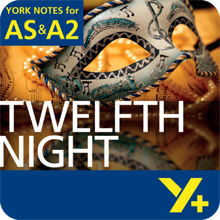Your Assessment
Read through the answer below and decide what grade to give it. Use the Hints & Tips to help you make your assessment.
The fictional identity of the country whose name is the answer to shipwrecked Viola's first question – 'Illyria' – suggests that any exploration of what is 'true' must be taken with a large pinch of (sea) salt. How are we to judge 'true love'? We think of it as innate, growing from something natural and not forced, but it is quite a leap of faith for us to believe the idea that a man might love a woman dressed as a boy who is his servant. On the other hand, it might imply that true love conquers all bounds – gender, status and appearance. In this sense, it is easy to argue that Orsino's expressions of love for Olivia in Act I Scene 1, peppered as they are by a litany of words and phrases associated with disease such as 'excess', 'pestilence' and 'dying fall' have more in common with Malvolio, described as 'sick of self-love', than with anyone else.
Yet, Orsino's extended metaphorical response to Curio's question of whether he will go hunting is part of a convention of courtly and romantic love poetry well established in earlier and contemporary verse, and could be seen to enhance his status as wretched lover. In the same way, Thomas Wyatt, in translating Petrarch, writes in his sonnet 'Whoso list to hunt' of his pursuit of a deer that is too wild to tame, a reference many claim to be to Anne Boleyn. Yet while Wyatt's sonnet is enigmatic and mysterious, here Orsino tells Curio directly who he is describing, and while he suggests it is he who has become the pursued deer chased by his 'desires like cruel and fell hounds' the comparison is forced and unconvincing, driven perhaps by vanity rather than courtly convention.
This self-love is equally evident in Orsino's other dialogues. Until the final denouement, he continues to play the role of spurned lover, safe in his court. For example, we observe his exchange with Viola/Cesario in Act I Scene 4 in which even the spontaneity of his expressions of love for Olivia are planned: 'Surprise her with discourse of my dear faith; / It shall become thee well to act my woes' (I.4.24–5).
While the idea of intermediaries between lovers is by no means unusual in Elizabethan society, the fact that Orsino instructs Cesario to 'surprise' Olivia and 'act' out his role, indicates a false basis to the love he professes. In contrast, Viola, subject to what John Wilders calls the 'motiveless, impersonal attacks of fate', behaves without much strategy, deciding 'on the spot' to disguise herself and see where things take her. There is arrogance therefore in Orsino's words, a feeling that a woman can be swayed by language and strategy, rather than raw direct emotion.
This has by no means dissipated by Act II Scene 4 when Viola/Cesario seems to have momentarily caught the disease of hyperbole herself when talking about love. When asked about the melody being played, she replies, 'It gives a very echo to the seat / Where love is throned.'
It is ironic that the woman who most personifies 'true' love in remaining silent about the Duke, and her seemingly dead brother, is reduced to mimicking Orsino's false expressions. However, whilst Orsino proceeds to argue later in the scene that women cannot feel passion as strongly as he can, which is as 'hungry as the sea' (line 96), he himself is finally driven to a kind of silence by Viola's 'Patience on a monument' speech. He tamely ends the scene by sending Viola off with a jewel for Olivia – with no further flowery instructions to act out a role.
One could argue that at the final scene's conclusion Orsino has been taught how to love truthfully by Viola, whose own understanding of it has been hardened by experience. He has become the 'hart' of his first speech, although his desires have driven him in a different direction from the one he was seeking. Ironically, Orsino's final speech to Viola states that she will remain in role as Cesario, 'For so you shall be while you are a man' (V.1.363), suggesting that 'true love' ultimately arises out of 'false face', if not out of 'false' love. To that extent, true love has triumphed.
